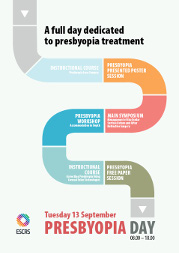Posters
The role of matrix regenerating agent in epithelialization time after collagen cross-linking for progressive keratoconus
Poster Details
First Author: U. Cengiz TURKEY
Co Author(s): C. Utine Yildirim Z. Ayhan
Abstract Details
Purpose:
To evaluate the role of matrix regenerating agent in complete epithelialization time after cross linking (CXL) for progressive keratoconus
Setting:
Dokuz Eylul University, Faculty of Medicine, Department of Ophthalmology
Methods:
Accelerated CXL (9 mW/cm2 UV-A for 10 minutes) was performed in all patients. Operated eyes were divided as those that received 1 drop of matrix regenerating agent (poly(carboxymethyl glucose sulfate), Cacicol®, Thea Pharma GmbH) at the end of the surgery, before application of bandage contact lens (Group 1) and those that did not (Group 2). All patients had standart postoperative medication including topical antibiotics (moxifloxacin, qid), steroids (fluoromethalone, tid), artificial tears (sodium hyaluronate, q2h) and oral vitamin C (625 mg/day). Full ophthalmological examination was performed postoperatively at each visit; time to complete epithelialization and any complications were noted.
Results:
There were 10 eyes of 8 patients in Group 1 and 12 eyes of 11 patients in Group 2. Preoperative age, visual, refractive and topograhic characteristics of the patients were not significantly different in both groups (p>0.05 for all). Postoperatively the mean epithelialization time was 4.7±2.4 days in Group 1, 7.9±6.6 days in Group 2 (p=0.08). One eye in Group 2 had a neurotrophic persistent epithelial defect that healed in 23 days, only after instillation of the matrix regenerating agent (one drop every other day), starting from postoperative 17th day.
Conclusions:
Application of one drop of matrix regenerating agent at the end of CXL surgery might offer a faster and safer corneal epithelialization postoperatively.
Financial Disclosure:
NONE





